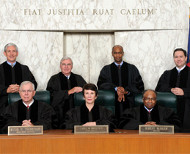Article from: www.thenewspaper.com/news/42/4240.asp
10/22/2013
Georgia Supreme Court: Roadblocks May Not Be Planned On The Spot
A police sergeant may not set up a roadblock on his own without advance planning in Georgia.
 The Georgia Supreme Court on Monday ruled that a police sergeant may not set up a roadblock without advance planning. The high court considered the barricade set up on Groover Road in Cobb County on April 9, 2010. Just after 7pm that evening, Douglas Wayne Brown pulled up to the roadblock in his Nissan Maxima with a pizza delivery sign.
The Georgia Supreme Court on Monday ruled that a police sergeant may not set up a roadblock without advance planning. The high court considered the barricade set up on Groover Road in Cobb County on April 9, 2010. Just after 7pm that evening, Douglas Wayne Brown pulled up to the roadblock in his Nissan Maxima with a pizza delivery sign.
Officer David Smith claimed he smelled marijuana coming from the Nissan, so Brown was directed to a secondary screening area. Ordered out of the car, Brown began to struggle with the officers, lunging to grab Smith's gun. Once subdued, Brown was charged him with driving under the influence of drugs. In fighting the charge at trial, Brown argued that the roadblock was illegal. A lower court judge agreed, but the Court of Appeals ruled the checkpoint was valid. The state Supreme Court sided with Brown and the trial judge.
A few days before the roadblock was put in place, a precinct captain had suggested a speed trap be set up on Groover Road in response to one citizen's complaint about speeding and littering. The narrow mountain road proved unsuitable for radar or laser guns, so Sergeant Andrew Marchetta decided to set up a roadblock to check licenses, registration and other paperwork.
In the 1998 case LaFotontaine v. Georgia, the state Supreme Court ruled that supervisors must set the time and location of the checkpoint in advance, not in the field, to abide by the US Supreme Court restriction that prohibits roadblocks for general crime control. Otherwise, officers could arbitrarily decide to set up a roadblock on the spot to stop a particular driver without having a reasonable suspicion. The issue in Brown's case became whether Sergeant Marchetta was acting as a supervisor or as a cop in the field when he set up the roadblock.
As a shift supervisor, Sergeant Marchetta qualified as "supervisory personnel" with authority to plan a roadblock under Georgia law, but the high court found substantial reason to doubt whether the roadblock had been set up in advance.
"The other officer who participated in the checkpoint, Officer Smith, testified at the hearing, and one reasonable interpretation of his testimony is that Sergeant Marchetta did not inform him of the planned checkpoint until Officer Smith arrived at the scene," Justice David E. Nahmias wrote for the court. "Furthermore, Sergeant Marchetta testified that he did not order the checkpoint in writing, and the state presented no documents at the hearing showing that Sergeant Marchetta (or any other supervisor) decided on the time that the checkpoint would be established prior to its implementation in the field."
Because the trial court heard Sergeant Marchetta testify first-hand and did not find his claims of advance planning credible, and the state provided no evidence of planning, the high court sided with Brown and ordered the evidence suppressed.
"The trial court correctly concluded that the checkpoint at which appellant was stopped violated the Fourth Amendment," Justice Nahmias concluded.
A copy of the decision is available in a PDF file at the source link below.
Source: Brown v. Georgia (Georgia Supreme Court, 10/21/2013)
Permanent Link for this item
Return to Front Page
 The Georgia Supreme Court on Monday ruled that a police sergeant may not set up a roadblock without advance planning. The high court considered the barricade set up on Groover Road in Cobb County on April 9, 2010. Just after 7pm that evening, Douglas Wayne Brown pulled up to the roadblock in his Nissan Maxima with a pizza delivery sign.
The Georgia Supreme Court on Monday ruled that a police sergeant may not set up a roadblock without advance planning. The high court considered the barricade set up on Groover Road in Cobb County on April 9, 2010. Just after 7pm that evening, Douglas Wayne Brown pulled up to the roadblock in his Nissan Maxima with a pizza delivery sign.